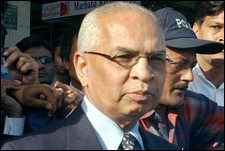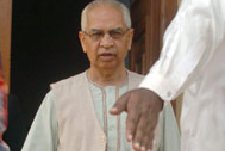Adil Najam
The swearing in of Justice Rana Bhagwandas as the Acting Chief Justice (ACJ) of Pakistan is not a ‘historical’ event in and of itself. However, Justice Bhagwandas now has a historical opportunity before him to influence the both the history of the institution he represents (the Judiciary) as well as the history of the country.


First some points of context:
- This is NOT the first time that Justice Bhagwandas has been the Acting Chief Justice. Indeed, as the next most senior judge on the Supreme Court, he has been called on to take this role before. Regular readers of ATP would remember seeing his picture here back in January in relation to a decision on Basant that he had then given, also as ACJ.
- Remember that he is the ‘Acting’ Chief Justice; the assumption and the point of fact being that Justice Iftikhar Chaudhry is still the Chief Justice.
- Even if he were to be appointed the Chief Justice eventually, he would not be the first non-Muslim Chief Justice of Pakistan. In fact, Justice Alvin Robert (A.R.) Cornelius served on the Supreme Court of Pakistan for 17 years, nearly 8 years of those as Chief Justice. Indeed, he is widely regarded as amongst the most respected and well-known Pakistanis to have held that office.
Indeed, it is a little disconcerting that his taking over this office – which was the procedurally appropriate thing to be done – is raising such attention. It is doing so, partly, on the assumption that the appointment of Justice Javed Iqbal as ACJ before him had some sinister purpose. Largely, it is because most Pakistanis have only just realized that Justice Bhagwandas is a practicing Hindu, and there are clearly those who want to make this an issue, even questioning his appropriateness for that reason. It is also, I think, that people’s faith in the judicial process is so low that they assume that he will soon, necessarily, assume the office of the Chief Justice. (It should be added that he is slated to retire at the age of 65, which happens this December; Justcie Iftikhar, on the other hand, does not retire till 2013).
Justice Rana Bhagwandas is – as, in fact, was Justice Javed Iqbal before him – considered to be a highly respected judge of high intellectual caliber and personal integrity. Born in 1942, Justce Bhagwandas became a lawyer like many other educated Sindhi Hindus and also has a post-graduate degree in Islamic studies and is considered an expert on constitutional law. He was a practising lawyer for about two years before being appointed to the bench in July 1967; he became a judge of the Sindh High Court in 1994; and of the Supreme Court in 2000. A challenge to his appointment to the higher judiciary on the grounds that he was a non-Muslim was dismissed by the Sindh High Court in 2002.
It is (a) because the prescribed procedure was followed here in his appointment, and (b) because he is a highly respected judge and a constitutional expert, that one should focus on this appointment. He is obviously aware of the historical decisions ahead of him. His first statement after taking his oath could be misconstrued as over-enthusiastic but one would like to believe that there is no hidden message in this statement and he is merely being diplomatic. According to The News:
Acting Chief Justice of Pakistan (ACJP), Rana Bhagwan Das has said that the presidential reference against Justice Iftikhar Chaudhry would be dealt with adequately. Talking to the media after taking oath as ACJP, Justice Bhagwan Das told that the Supreme Judicial Council would be taking a decision on the issue of holding the hearing of the reference in open or in camera. He said that the judiciary would not disappoint the people and the nation would soon hear the good news.
The history of the Pakistan Supreme Court and of Justices in this situation is a ‘busy’ one. Too busy, in my opinion. But it is not an even one. There have been shameful examples when the courts have allowed themselves to become tools in the hands of military and political leaders; but there have also been times when the Justices have made the nation proud by standing up to all pressures and deciding solely on the merit of the cases.
Judges, of course, love to hear about precedent. Here, the precedence lies in both direction. The question is, which precedent will Justice Rana Bhagwandas follow?
For anyone interested in the history of the Judiciary in such cases – both good and bad – do watch this very informative BBC report on the subject.
http://youtube.com/watch?v=_gE39xhnm0w


















































Sohail YOU WROTE
Jabir, not sure if I follow your logic.
Yes, the priviliged corrupt class is breaking laws. Does that mean that it is OK to let these madrassa wallas take teh law into tehir own hands and apply these Taliban like tactics.
__________________________________________________
I DISAGREE WITH YOU. PEOPLE WILL ALWAYS FOLLOW THE LEADERS. LEADERS, GOVERNMENT FUNCTIONARIES,MILITARY ESTABLISHMENT, POLITICAL APPOINTEES HAVE TO SET EXAMPLES. THEY HAVE RESPONSIBILITIES.
I’LL GIVE YOU A SMALL EXAMPLE;
YEARS AGO WHEN I WAS YOUNGER, I WAS RIDING WITH A FRIEND WHO HAD TO DROP HIS AILING FATHER AT KARACHI AIRPORT. WE ALMOST HAD A FIGHT HEADING TO ARRIVAL TERMINAL WHEN THE FAUJI AT ENTRANCE BARRICADE STOPPED HIM FROM HEADING TO DROP OFF HIS OLD MAN AT THE TERMINAL (WHERE THE LAW HAD BANNED TRAFFIC BECAUSE OF SECURITY THREAT). HOWEVER WHILE HE WAS IN THE PROCESS OF REVERSING HIS CAR TO GO TOWARDS THE PARKING LOT, THEY ALLOWED A “ONE STAR” ARMY OFFICERS CAR WHICH WAS CARRYING A BRIG’S FAMILY MEMBERS. MY FRIEND’S FATHER WAS 65 YEARS OLD WHO WAS HEADING TO LAHORE AND THERE WAS A HEAVY RAIN POURING(LONG DEAD NOW). MY FRIEND WHO HAD NEVER DONE ANYTHING DRASTIC IN LIFE ALMOST RAN OVER THE FAUJI, HAD A VERBAL BOUT WITH HIM FOR ALLOWING THE FAUJI CAR WHICH WAS CARRYING CIVILIANS WHILE RESTRAINING HIM. THE GUARD BACKED AWAY FEARING THE OUTBURST AND LET US GO ON. MY FRIEND GREW UP TO BE A HEART SURGEON AND LIVES IN USA NOW. GREAT ACCOMPLISHMENTS IN LIFE..
WOULD HE HAVE DONE SO IF THE GUARD HAD TURNED AWAY THE OTHER CAR??? I DOUBT IT.
PEOPLE LIKE CHILDREN WILL FOLLOW THE EXAMPLES SET BY LEADERS AND PARENTS . YOU CANNOT EXPECT AN ABUSED CHILD TO GROW UP TO BE A MODEL CITIZEN. CHILDREN WITH PHYSICAL ABUSE WILL TAKE THE SAME TRAIT TO SCHOOL AND ABUSE OTHER CHILDREN. A NATION WILL ONLY EVOLVE WHEN LEADERS SET EXAMPLES.HOW CAN YOU COMPARE AND JUSTIFY A MAULVI IN MADRASSA TO THE ACTIONS OF A LAW MINISTER WHO HAD THE GUTS TO THREATEN PEOPLE WITH STATEMENTS LIKE “ARM UP YOURS….” AND THAT TOO ON NATIONAL TV.
MAYBE I LOST YOU SOMEWHERE.
Thanks Farrukh. You make a good point.
Can you please not use ALL CAPS. That is like shouting on internet. Thanks.
Also, I am no fan of the military, but given that you have mis-stated and exaggerated what Wasi Zafar said (what he really said was bad enough anyhow), I am not sure that I am willing to believe the rest of your story either.
Sohail, of course I am against breaking law. But the problem here is to distinguish between the scale of crime. A grain of sand and a mountain are not equal. When you consider the blunders carried out by the ruling elite (like the division Pakistan, the plundering of national resources, the criminal negligence regarding the welfare of ordinary citizens), and compare it to non-issues like the madrassa walas. Are these even comparable? You be the judge. All I am implying is the bigger crime must be punished before the smaller one…..isn’t it logical?
KAWA1, I like and agree what you say about ” I think everyone in Pakistan should have an open right to bring forth their views, may it be as ridiculous. We as a nation should have the patience to listen to all opinions.”
As long as we also agree that no mater who is in goevrnement NO ONE has the right to take other people hostages just because they do not like their morality. NO ONE. A dictatorial government is bad and we must all oppose it as we have again an again here, but it is no excuse for crimanal and inhuman behavior like what we are seeing in this ase of taking a woman hostage.